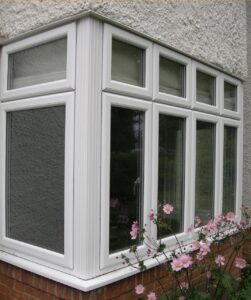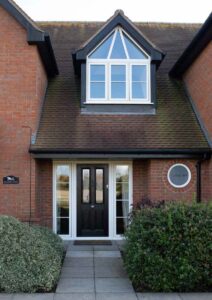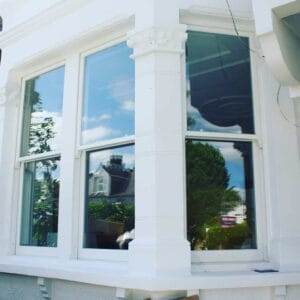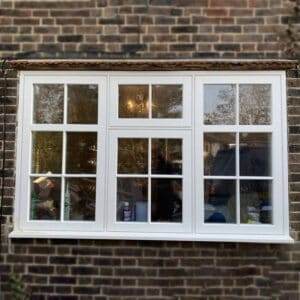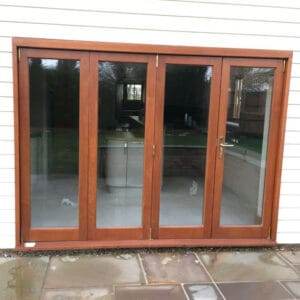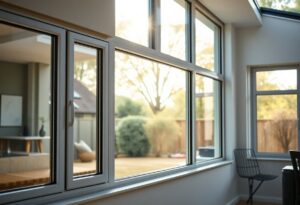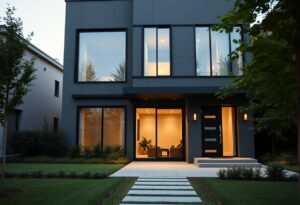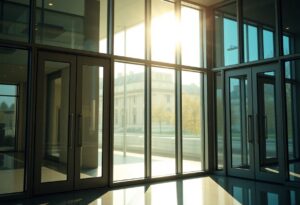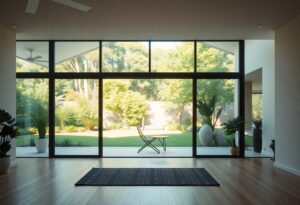Embarking on the journey of upgrading your home with energy-efficient sliding doors can have a profound impact on both the aesthetics and efficiency of your living space. Not only do these doors provide a sleek and modern look, but they also serve as a key element in improving the overall energy efficiency of your home. With rising concerns about energy consumption and environmental impact, it is crucial to consider the benefits of energy-efficient home improvements, such as sliding doors. In this blog post, we will explore the various factors to consider when selecting and installing energy-efficient sliding doors, the potential cost savings, and the positive environmental impact that comes with making this investment.
Key Takeaways:
- Energy Efficiency: Upgrading to energy-efficient sliding doors can help reduce heat loss in the winter and keep your home cooler in the summer, leading to lower energy bills.
- Aesthetics: Modern sliding doors come in a variety of styles and finishes, enhancing the overall look and feel of your home while improving natural light flow.
- Safety and Security: Many energy-efficient sliding doors come with advanced locking mechanisms and toughened glass to increase the security of your home.
- Noise Reduction: Upgraded sliding doors with double or triple glazing can significantly reduce outside noise, creating a quieter and more peaceful living environment.
- Resale Value: Energy-efficient upgrades, including sliding doors, can increase the resale value of your home, making it more attractive to potential buyers.
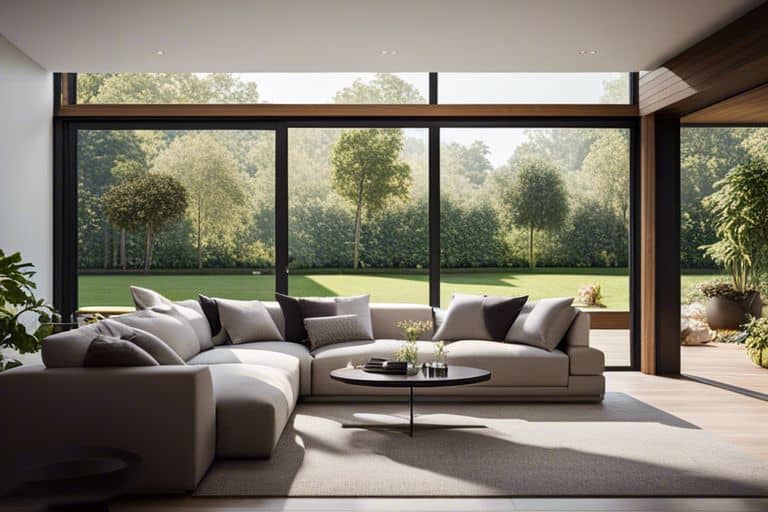
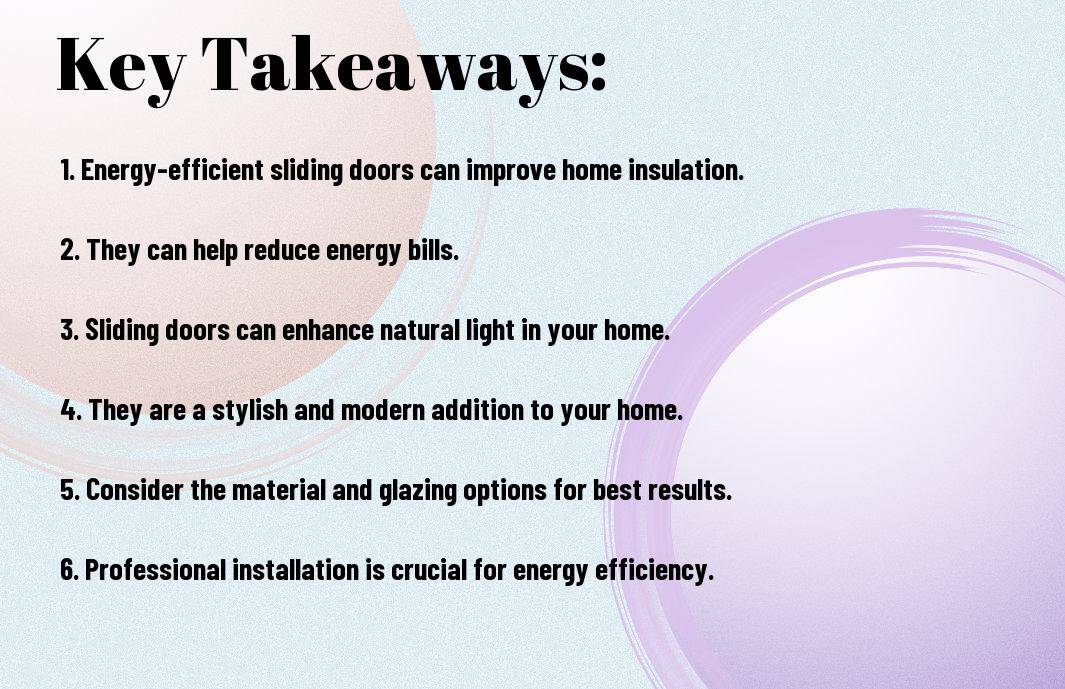
Understanding Sliding Door Energy Efficiency
When it comes to upgrading your home with energy-efficient sliding doors, it’s important to understand the benefits they offer. One key aspect of energy efficiency is the reduction of utility bills. You can learn more about how new patio doors can reduce utility bills here.
What Makes a Sliding Door Energy-Efficient?
Energy-efficient sliding doors are designed with advanced materials and insulation, which help to reduce heat transfer and improve thermal efficiency. The construction of the doors, including the use of double or triple glazing, helps to minimise heat loss and maintain a comfortable temperature inside the home. Additionally, high-quality seals and weather-stripping prevent drafts and air leakage, further enhancing energy efficiency.
Comparing Traditional and Energy-Efficient Sliding Doors
When comparing traditional sliding doors to energy-efficient ones, it’s important to understand the significant differences. Energy-efficient doors are equipped with advanced features such as Low-E glass, argon gas fillings, and insulated frames, which contribute to improved thermal performance. On the other hand, traditional sliding doors typically lack these energy-saving components and may lead to increased energy consumption.
| Traditional Sliding Doors | Energy-Efficient Sliding Doors |
| Single glazing | Double or triple glazing |
| Standard frames | Insulated frames |
| No Low-E glass | Low-E glass for improved thermal performance |
By upgrading to energy-efficient sliding doors, homeowners can benefit from reduced energy consumption, lower utility bills, and a more comfortable living environment. The investment in energy-efficient doors not only contributes to cost savings but also helps to reduce the household’s carbon footprint, making it a positive choice for both the wallet and the environment.
Selecting the Right Energy-Efficient Sliding Doors
When upgrading your home with energy-efficient sliding doors, it’s crucial to select the right ones to maximise energy savings and comfort. Consideration of materials, insulation, glazing options, and solar gain is essential in making an informed decision.
Materials and Insulation
When considering energy-efficient sliding doors, it’s important to pay attention to the materials used and the level of insulation they provide. Opt for high-quality materials such as uPVC, timber, or aluminium which offer excellent insulation properties. Look for doors with multiple chambers and weather-stripping to prevent air leakage and enhance energy efficiency.
Glazing Options and Solar Gain
Glazing options play a significant role in the energy efficiency of sliding doors. Opt for double or triple glazing with low emissivity coatings to minimise heat transfer and reduce energy loss. Consider the orientation of your home and the amount of sunlight it receives to maximise solar gain and natural heating during winter months. Additionally, look for doors with insulated frames and thermal breaks to further enhance energy efficiency.
Furthermore, consider the impact of glazing on natural light and views, and choose the right combination of glazing options to meet your specific needs. This will ensure that you not only improve energy efficiency but also enhance the overall comfort and aesthetics of your home.
Installation and Maintenance
When upgrading your home with energy-efficient sliding doors, proper installation and regular maintenance are essential for optimal performance. In this chapter, we will discuss the importance of professional installation versus the option of DIY installation, as well as the steps to maintain your sliding doors for optimum efficiency.
Professional vs. DIY Installation
Before deciding on the installation method for your energy-efficient sliding doors, it is important to consider the complexity of the task. While a skilled DIY enthusiast may be able to handle the installation, it is highly recommended to opt for professional installation. Professional installers have the expertise and tools to ensure that the doors are correctly fitted, sealed, and aligned, reducing the risk of inefficiency or safety hazards.
Maintaining Your Sliding Doors for Optimum Efficiency
Regular maintenance is crucial for the longevity and energy efficiency of your sliding doors. This includes cleaning the tracks, lubricating the rollers, and inspecting for any signs of wear and tear. By addressing any issues promptly, you can prevent problems from escalating and ensure that your doors continue to operate smoothly and efficiently.
It is also advisable to check the weatherstripping and seals for any damage, as these components play a crucial role in thermal insulation and energy efficiency. A well-maintained sliding door not only enhances the comfort of your home but also contributes to lower energy bills and a reduced environmental impact.
Cost-Benefit Analysis
When it comes to upgrading your home with energy-efficient sliding doors, it’s important to conduct a cost-benefit analysis to determine if the investment is worthwhile. Consider both the upfront costs and the long-term savings, as well as the impact on property value and marketability.
Upfront Costs vs. Long-Term Savings
Energy-efficient sliding doors may have higher upfront costs compared to traditional doors, but the long-term savings can be significant. With improved insulation and reduced energy consumption, homeowners can expect lower energy bills, which could offset the initial investment over time. It’s important to weigh the initial expense against the potential savings to determine the true cost-effectiveness of these upgrades.
Impact on Property Value and Marketability
Investing in energy-efficient sliding doors can positively impact the property value and marketability of your home. Potential buyers are increasingly looking for energy-efficient features that can lead to lower utility costs. Additionally, properties with energy-efficient upgrades are often seen as more attractive and desirable in the market.
Upgrading to energy-efficient sliding doors can enhance your property’s value and marketability, while also providing long-term savings through improved insulation and reduced energy consumption.
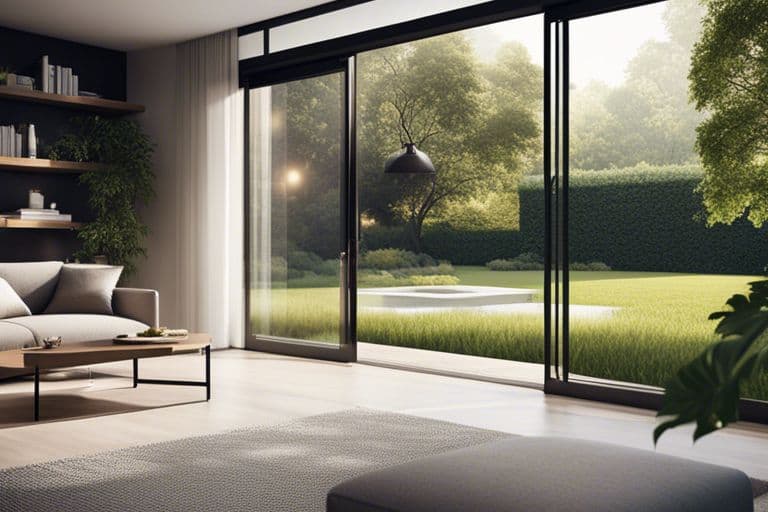
Upgrading Your Home with Energy-Efficient Sliding Doors
Upgrading your home with energy-efficient sliding doors is a smart investment that not only enhances the aesthetic appeal of your property but also improves its energy efficiency. By installing high-quality sliding doors, you can reduce heat loss in the winter and keep your home cool in the summer, ultimately leading to lower energy bills. Additionally, these doors allow for ample natural light to enter your living space, creating a bright and inviting atmosphere. If you’re considering upgrading your home with sliding doors, it’s essential to choose a reputable supplier and ensure proper installation to maximise the benefits. For more tips on improving your house with sliding glass doors, visit Improve Your House With Sliding Glass Doors.
FAQ
Q: Why should I upgrade to energy-efficient sliding doors for my home?
A: Energy-efficient sliding doors can help reduce energy bills by preventing heat loss and improving insulation. They also provide better natural light and ventilation, and contribute to a more environmentally-friendly home.
Q: What are the benefits of upgrading to energy-efficient sliding doors?
A: Upgrading to energy-efficient sliding doors can improve the aesthetics of your home, increase security, reduce outside noise, and enhance the overall value of your property.
Q: How do energy-efficient sliding doors help to save energy?
A: Energy-efficient sliding doors are designed with advanced insulation and glazing to minimise heat transfer, keeping your home warmer in winter and cooler in summer. This reduces the need for constant heating and cooling, leading to lower energy consumption.
Q: What factors should I consider when choosing energy-efficient sliding doors for my home?
A: When choosing energy-efficient sliding doors, consider factors such as the material, glazing options, weatherproofing, security features, and energy efficiency ratings to ensure the best fit for your home.
Q: Are there any government incentives or rebates for upgrading to energy-efficient sliding doors?
A: Depending on your location, there may be government incentives or rebates available for upgrading to energy-efficient sliding doors. It is recommended to check with local authorities or energy efficiency programs for potential financial support or benefits.

